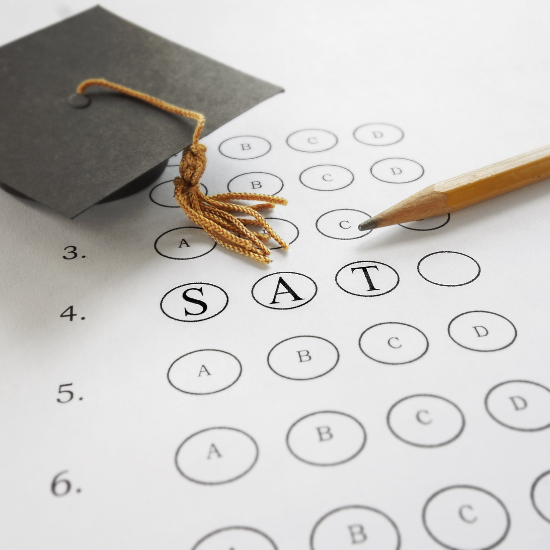The High School Student's Glossary of SAT Terms
December 2022
When taking the SAT, students want to be free of anything that may add confusion or pull their focus from the test. Occasionally, however, you may face terminology that you are unfamiliar with or are uncertain about. It's important to understand the meaning of these words before taking the test in order to have the best outcome.
Accommodation: An adjustment that is made to meet the specific needs of an individual. With the SAT, accommodations may be made to meet the needs of a person with a disability. Examples of accommodations include extended time, assistive devices, pre-recorded audio, additional breaks, or larger print.
Answer Choices: The four options that are listed as answers to multiple-choice questions. Answer choices are typically assigned letters from A to D, with only one being correct.

Diagnostic Test: A brief test given to determine or assess someone's current skill level. This allows the practice program to recommend which skills the test-taker should work on. Students take these tests before the SAT.
Intelligence Test: An exam that determines the test-taker's level of intelligence. The results are based on the test-taker's age and the accuracy of their answers to the exam's questions. Despite the importance that's placed on the SAT, it does not test intelligence, only college readiness.
Multiple-Choice Question: A question with two or more answer options that a test-taker must choose from, one of which is the correct answer
Percentile Rank: An indicator of how well a person has performed compared to others taking the same test. The percentile rank given shows the amount of test-takers who received a score that was the same as or less than yours. With the SAT, the percentile ranking is based on the total group of students taking the SAT in the U.S. For example, if a student taking the SAT is in the 40th percentile, that individual has performed as well as or better than 40 percent of the other people taking the test.
Proctor: An individual who serves as a test supervisor. The proctor may check student identification during check-in, monitor the individuals taking the test, and ensure that everyone is quiet and following the rules. A proctor may also collect materials from test-takers.
Prompt: A prompt is content that a student must address so they can complete an assignment. It may be a question, an image, or a sentence. In terms of the SAT, the prompt is another name for the SAT essay assignment.
Raw Score: The raw score of a test is based on the actual number of correct answers that a person has given on a test. If a person gets 80 out of 100 questions correct on a test, then they have a raw score of 80.
Scaled Score: The scaled score of a test takes more factors into account than the raw score. These factors, which include the difficulty of the test questions and how well the rest of the test-takers performed, are used to adjust the score. This ensures that the tests are fairly scored and that no one is penalized or given an unfair advantage. Scaled scores range between 200 and 800 points per section.
Subscore: Subscores measure the test-taker's skill in seven skill areas. Math has three subscores: Heart of Algebra, Problem-Solving and Data Analysis, and Passport to Advanced Math. Evidence-Based Reading and Writing has four subscores: Expression of Ideas, Standard English Conventions, Words in Context, and Command of Evidence.
Student-Produced Response: A student-produced response is one that you have to come up with yourself, rather than being given choices to pick from. Grid-ins, which appear in the SAT Math section, are examples of student-produced response questions.
Test Specifications: Test specifications are the details of a test. They describe the content that the test covers, the formatting, and how the test is scored.
Total Score: The combination of a student's scaled scores. These are the scores from the Evidence-Based Reading and Writing section and the Math section. The total score for the SAT will be between 400 and 1,600 points.
More Resources
- Understanding Scaled Scores
- Student-Produced Responses
- SAT Subscores and Cross-Test Scores
- What Is a Proctor?
- SAT and ACT Test Accommodations: What to Know
- ADA Requirements: Testing Accommodations
- How Students Taking the SAT With Extra Time Accommodation Can Use Their Time Wisely
- Test Percentile Rank Scores in Education
- Getting Into Medical Assistant School
- Diagnostic Tests: Why Do They Matter?
